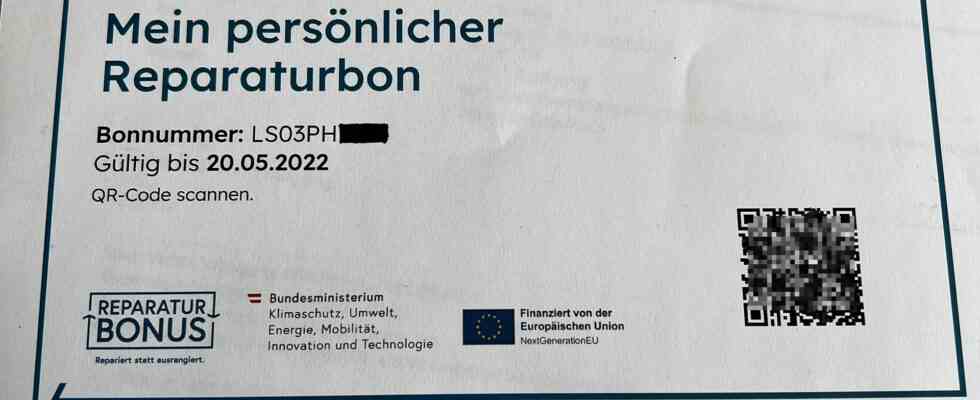Status: 05/03/2022 1:39 p.m
The European Union wants to ensure that more electronic devices are repaired instead of being bought new. Austria is the first EU country to introduce a nationwide subsidy for repair costs.
“Repaired instead of discarded” – a second life for defective electronic devices. This is the basic idea behind the EU-wide repair bonus. It doesn’t matter whether it’s a mobile phone, a razor or a washing machine: in Austria there is now a subsidy from the EU for private individuals to have it repaired. The program includes all household electrical appliances, from kettles to coffee machines and electric pianos. Half of the repair costs are covered, up to a maximum of 200 euros per device.
Even high quality ends up in the trash
“We produce enormous amounts of electronic waste every year and pollute the environment in the process,” said the responsible Austrian climate protection minister Leonore Gewessler from the Greens. A brand new device is often just a click away, but repairs have a reputation for being expensive and cumbersome. High-quality devices often end up in the trash, and that is “the worst of all solutions”. The bonus should therefore make it more attractive to have a broken device repaired instead of buying a new one.
The program has a volume of 130 million euros and is scheduled to run until 2026. The funds for this come from the EU’s reconstruction fund. The repair bonus is the result of European cooperation, and it is “a proud moment when something succeeds in Europe when we do it together,” said the EU Commission representative in Vienna, Martin Selmayr. The EU reconstruction fund is intended to finance reforms and investments that will make Europe “more resilient, more ecological and more digital” after the corona crisis, according to Selmayr. Austria is the first EU country to introduce a nationwide repair bonus. In Germany, there have only been regional projects in Bavaria and Thuringia so far. A date for nationwide implementation has not yet been set.
Partner companies are still missing
The repair voucher can be downloaded from the Internet by persons registered in Austria and redeemed at one of the participating companies. As soon as a voucher has been redeemed, another one can be called up for another device, the number is not limited. The bonus covers the working time including travel costs, material costs, the shipping costs for material and spare parts orders and also the working time for preparing the cost estimate.
However, in the capital Vienna, for example, the rush is still limited. There has been a regional modification of the repair bonus here since September 2020. The main problem: the waiting time for the repair to be carried out. The repair bonus can only be redeemed in certain partner companies that have previously registered for it. There are more than 1200 companies across Austria. In Vienna, however, there are only a handful of companies that accept a repair of a razor with a repair bonus, mostly from the field of social service providers that were founded by social or environmental organizations or are associated with them.
But the number of participating companies is now to be increased bit by bit through targeted letters and advertising measures by the Chambers of Commerce. According to the city administration, more than 35,000 objects have been repaired in Vienna since 2020, thereby avoiding around 850 tons of CO2 and around 355 tons of waste.
CO2 savings through longer service life
The environmental organization Global 2000 welcomes the initiative, but at the same time calls for an extension of the subsidy to all product groups and tax advantages for repairs. Only by avoiding new purchases can “the transition to a functioning recycling economy” be achieved, according to Anna Leitner, spokeswoman for resources from Global 2000 in Austria. The extended useful life of objects not only contributes to environmental protection; the repair voucher strengthens regional economic cycles, increases added value, secure jobs and promotes awareness of a resource-saving lifestyle.
According to Global 2000, replacing an old washing machine, even taking into account the lower energy consumption of a new appliance, only pays off from an ecological point of view after 17 to 23 years at the earliest. If the service life of all washing machines, notebooks, vacuum cleaners and smartphones in the EU were extended by just one year, around four million tons of CO2 could be saved. That would be the same savings that would be achieved if there were suddenly two million fewer cars on the road.

